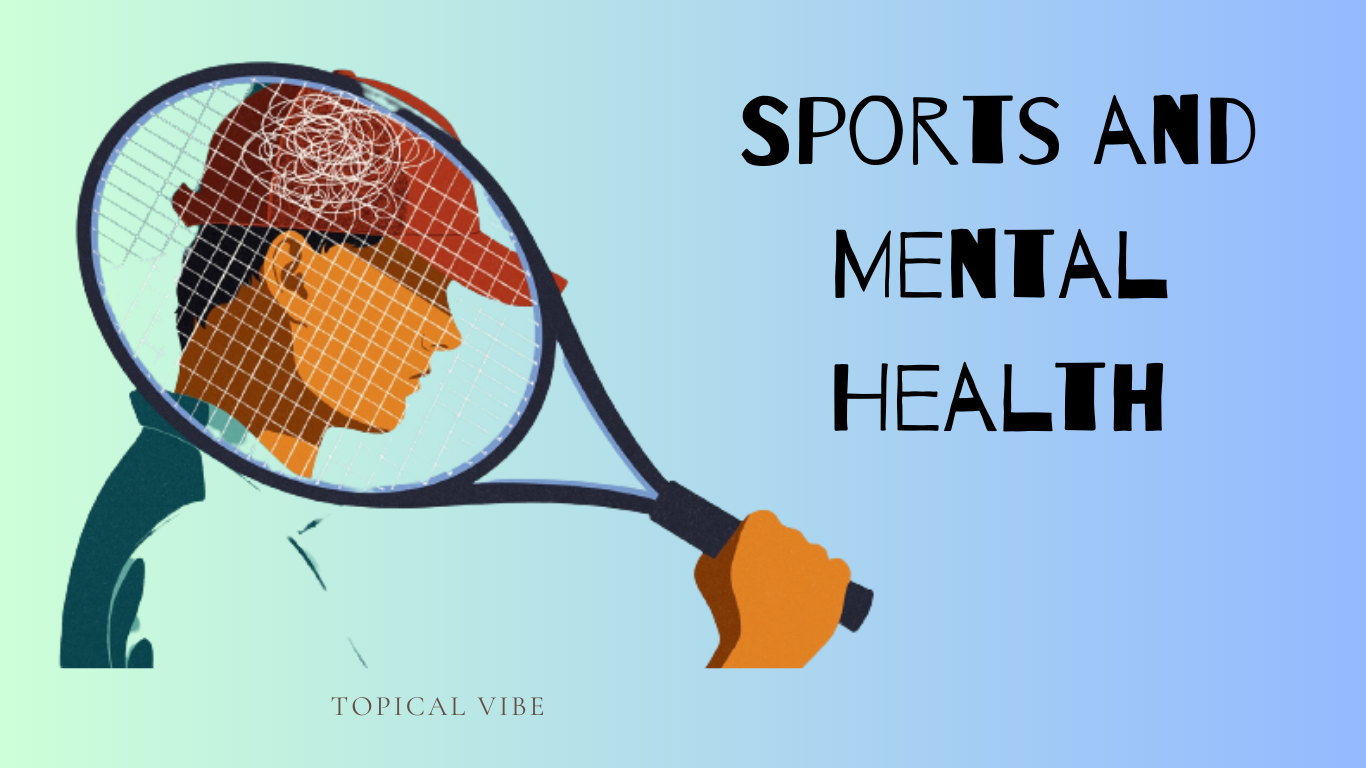Sports and Mental Health: Link Between Physical Activity and Well-Being

16 August 2023
Welcome to our blog! Today, we’re diving into the fascinating world of sports and mental health. We all know that physical activity is important for our physical well-being, but did you know it also has a profound impact on our mental well-being? It’s true! Engaging in sports and other forms of exercise can have incredible benefits for our mental health. From reducing symptoms of anxiety and depression to boosting self-esteem and promoting overall happiness, the link between physical activity and mental well-being is undeniable. So grab your sneakers, because we’re about to explore the many ways that sports can improve your mental health. Let’s get started!
The Link Between Sports and Mental Health
Engaging in sports and physical activity is not just about building strong muscles and improving cardiovascular health. It goes beyond the physical benefits; it also has a profound impact on our mental well-being. The link between sports and mental health is multifaceted, with various factors contributing to its positive effects.
Participating in sports helps to reduce symptoms of anxiety and depression. When we engage in physical activity, our brains release endorphins – those feel-good chemicals that boost our mood and help us feel happier. Regular exercise can act as a natural antidepressant, alleviating symptoms of these common mental health conditions.
Moreover, sports provide an excellent outlet for stress relief. When we’re physically active, our bodies produce cortisol – the hormone responsible for stress response. By engaging in activities like running or playing team sports, we effectively lower cortisol levels while increasing feelings of relaxation and calmness.
Additionally, being part of a sports team or community fosters social connections and support networks. Humans are inherently social beings; having a sense of belonging promotes positive mental health outcomes such as increased self-esteem and reduced feelings of loneliness or isolation.
Furthermore, participating in sports improves cognitive function by enhancing focus, concentration, memory retention capabilities – all essential elements for maintaining good mental health throughout life’s challenges.
In conclusion: The link between sports and mental health is undeniable. Engaging in physical activity not only strengthens our bodies but also uplifts our spirits by reducing symptoms of anxiety and depression while providing an outlet for stress relief. Sports foster social connections that promote positive mental well-being alongside improved cognitive function to tackle life’s challenges head-on! So don’t hesitate – lace up your sneakers today because the benefits await you on both fronts – physical fitness AND mental well-being!
The Benefits of Physical Activity for Mental Health
Engaging in regular physical activity has numerous benefits for our overall well-being, including significant positive effects on mental health. The connection between sports and mental health is undeniable, as exercise releases endorphins – the feel-good hormones – that can boost mood and reduce symptoms of anxiety and depression.
Physical activity promotes better sleep, which is essential for maintaining good mental health. When we engage in sports or any form of exercise, it helps to regulate our sleep patterns, making it easier for us to fall asleep at night. Quality sleep contributes to improved cognitive function and emotional resilience.
Furthermore, participating in sports or other physical activities provides an opportunity for social interaction and connection with others who share similar interests. This social aspect can help combat feelings of loneliness and isolation, which are common contributors to poor mental health.
Regular exercise also acts as a powerful stress reliever by reducing the levels of cortisol – the stress hormone – in our bodies. Engaging in physical activities such as running or playing a sport allows us to channel our energy into something constructive while releasing tension from both our minds and bodies.
In addition to these immediate benefits, engaging in regular physical activity also plays a vital role in preventing long-term mental health conditions such as chronic stress disorders or even cognitive decline associated with aging.
Incorporating regular physical activity into your routine not only improves your physical fitness but also has profound positive effects on your mental well-being. Whether it’s going for a jog outside or joining a local sports team, finding an enjoyable way to stay active can greatly contribute to maintaining good mental health throughout all stages of life
The Different Types of Mental Health Conditions
Mental health is a complex and varied field, encompassing a wide range of conditions that can affect individuals in different ways. Each mental health condition has its own set of symptoms and challenges, making it important to understand their unique characteristics.
One common type of mental health condition is anxiety disorders. These conditions are characterized by excessive worry, fear, or unease that can interfere with daily life. Generalized anxiety disorder, panic disorder, and social anxiety disorder are just a few examples within this category.
Another prevalent mental health condition is depression. This mood disorder can cause persistent feelings of sadness, loss of interest or pleasure in activities, changes in appetite or sleep patterns, low energy levels, and difficulty concentrating.
Bipolar disorder is another well-known mental health condition characterized by extreme shifts in mood ranging from manic episodes (elevated mood) to depressive episodes (low mood). Individuals with bipolar disorder may experience periods of high energy and impulsivity followed by periods of intense sadness or hopelessness.
Eating disorders such as anorexia nervosa or bulimia nervosa involve unhealthy behaviors surrounding food consumption and body image. These disorders often have physical effects as well as psychological ones.
Attention-deficit/hyperactivity disorder (ADHD) affects both children and adults and involves difficulties with attention span, hyperactivity/impulsivity or both. It can impact academic performance and relationships if left untreated.
Post-traumatic stress disorder (PTSD) occurs after experiencing a traumatic event such as combat exposure or sexual assault. Symptoms include intrusive thoughts about the trauma, flashbacks, nightmares and severe anxiety. Obsessive-compulsive disorder (OCD) is characterized by recurring unwanted thoughts (obsessions) that lead to repetitive behaviors (compulsions).
It’s important to note that these are just some examples – there are many other types of mental health conditions not covered here. Each individual’s experience with a mental health condition is unique, making it crucial to approach treatment
How to Get Started with Physical Activity
Getting started with physical activity can be daunting, especially if you’re new to exercise or have been out of the game for a while. But don’t worry, taking that first step is easier than you think! Here are some tips to help you get started on your journey towards better mental health through physical activity.
- Start Small and Gradually Increase: Don’t push yourself too hard right from the start. Begin with short sessions of low-intensity exercise, such as walking or light stretching. As your fitness level improves, gradually increase the duration and intensity of your workouts.
- Find Activities You Enjoy: The key to sticking with any form of physical activity is finding something you genuinely enjoy doing. Whether it’s swimming, dancing, playing tennis, or hiking in nature – choose activities that make you look forward to moving your body.
- Set Achievable Goals: Setting realistic goals will keep you motivated and give you a sense of accomplishment when achieved. Start by setting small achievable targets like exercising three times a week for 30 minutes each session.
- Create a Routine: Consistency is essential when it comes to reaping the benefits of physical activity for mental health. Establishing a regular routine will help make exercise part of your daily life rather than an occasional chore.
- Get Support: Having someone to join you on this journey can provide encouragement and accountability. Find an exercise buddy or consider joining group classes where you can meet like-minded individuals who share similar goals.
Remember, getting started is often the hardest part! Take it one step at a time and be patient with yourself as progress takes time but rest assured knowing that every little effort counts towards improving both your physical well-being and mental health
Tips for Staying Motivated
Staying motivated to engage in physical activity can sometimes be a challenge, but it is crucial for maintaining good mental health. Here are some tips to help you stay motivated and make exercise a consistent part of your routine.
- Set realistic goals: Start by setting achievable goals that align with your abilities and interests. Whether it’s aiming to walk 30 minutes every day or completing a marathon, having clear objectives will give you something to work towards.
- Find activities you enjoy: Experiment with different types of physical activities until you find ones that bring you joy. It could be dancing, cycling, swimming, or playing team sports – the options are endless! When you enjoy what you’re doing, it becomes easier to stay committed.
- Establish a routine: Make exercise a regular part of your schedule by incorporating it into your daily routine. Choose specific days and times that work best for you and stick to them as much as possible.
- Mix it up: Avoid boredom by varying your workouts and trying new things regularly. This not only keeps things interesting but also challenges different muscle groups and prevents plateauing.
- Stay accountable: Share your fitness goals with friends or family members who can support and encourage you along the way. You can even consider joining group classes or finding an exercise buddy who shares similar fitness aspirations.
- Celebrate achievements: Acknowledge and celebrate each milestone reached along your fitness journey – big or small! Treat yourself when meeting significant milestones like running an extra mile or increasing weights during strength training sessions.
Conclusion
It is clear that there is a strong link between sports and mental health. Engaging in physical activity can have numerous benefits for our well-being, both physically and mentally. Whether you are struggling with stress, anxiety, depression, or simply want to improve your overall mood and energy levels, incorporating regular exercise into your routine can make a significant difference.
From reducing symptoms of various mental health conditions to boosting self-esteem and promoting better sleep, the positive impact of physical activity on mental well-being cannot be overstated. It provides an outlet for stress relief and helps release endorphins that contribute to feelings of happiness and relaxation.
Find a sport or exercise routine that suits your interests and preferences so that you can maintain motivation over time.
While staying motivated can sometimes be challenging, remember to set realistic goals for yourself and celebrate even the smallest achievements along the way. Surround yourself with a supportive community or enlist the help of friends or family members who can join you in your fitness journey.
So lace up those sneakers, grab your racket or swim goggles – whatever it takes to get moving. Your mind will thank you!
Remember: Sports + Mental Health = Well-Being!





